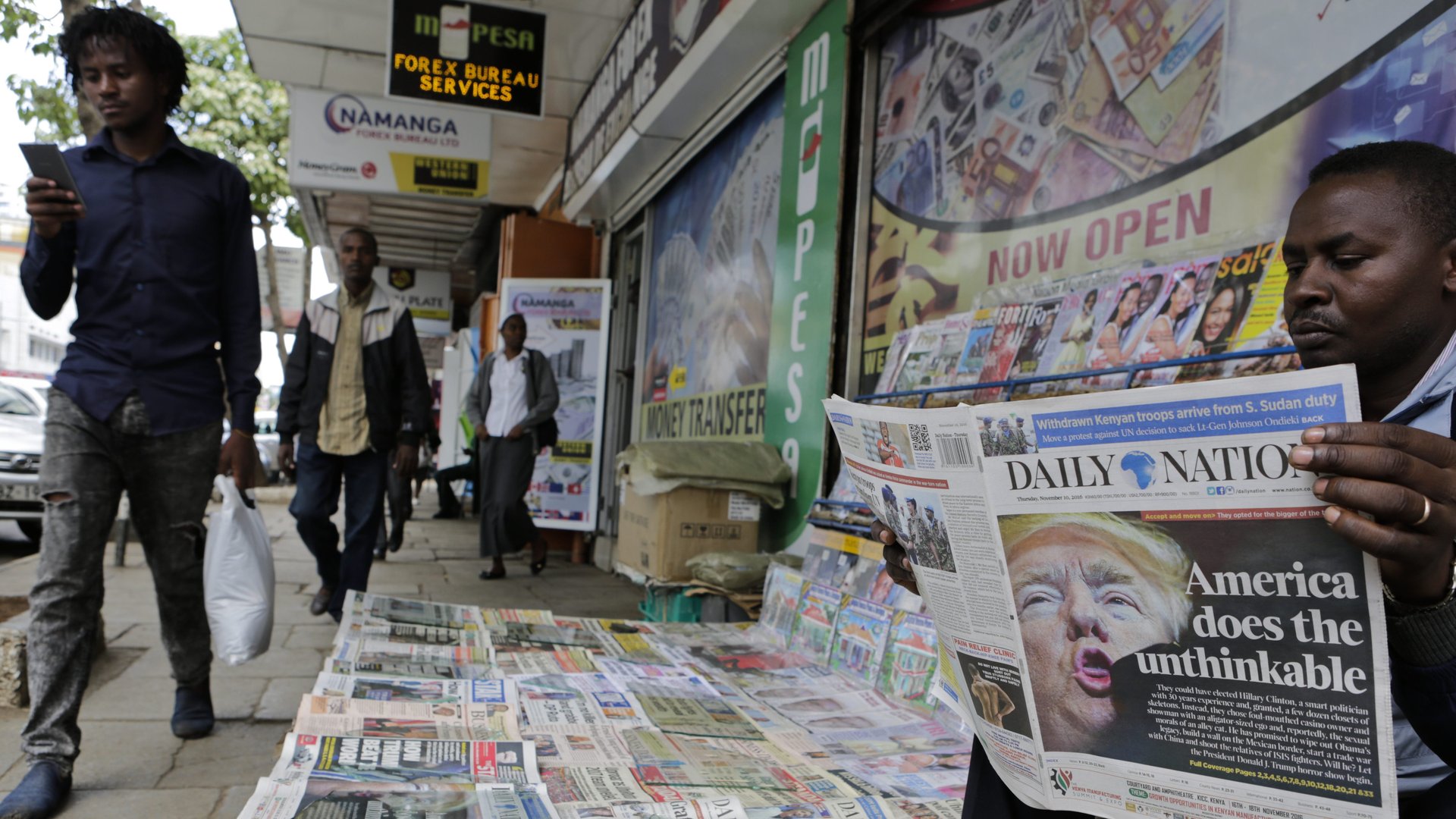WhatsApp and Facebook are driving Kenya’s fake news cycle
Social media networks like Facebook and WhatsApp are being used to spread fake news stories in Kenya—less than three weeks before the country holds a tightly-contested general election. The prevalence and impact of fake news are also becoming a question of concern for political campaigners, journalists, government officials, and companies like Google.


Social media networks like Facebook and WhatsApp are being used to spread fake news stories in Kenya—less than three weeks before the country holds a tightly-contested general election. The prevalence and impact of fake news are also becoming a question of concern for political campaigners, journalists, government officials, and companies like Google.
In the past, false stories were used to peddle narratives about the death of showbiz celebrities, the import of plastic rice into Kenya, the dangers of certain online games, or the appearance of Barack Obama’s Kenyan birth certificate.
But observers now say there’s a concerted attempt at spreading misinformation and to perhaps sway public opinion. As the campaigns have gotten underway, there has been an increase in the number of attack ads appearing online, besides the manufacturing of falsehoods disguised as news material. Some users on Kenya’s social media networks have also blamed some of the misinformation on Cambridge Analytica, a company at the center of a growing controversy over the use of data mining and psychological profiling to influence both the Brexit vote in the UK and the Donald Trump election in the US.
“It seems as if there’s a drive, a deliberate effort to create fake stories,” Catherine Gicheru, the Kenya head for the data journalism and civic technology initiative, Code for Africa, said.
Deliberate spreading of false information is now a core part of the news mix in Kenya, according to a study which revealed 90% of Kenyans had heard or seen false stories related to the election, with a cross section of the population including official groups, friends, and families all using social media to spread misinformation. The study, by Portland and GeoPoll, had asked a sample of 2,000 Kenyans about their consumption of news related to the upcoming polls.
So called fake news and misinformation has been a significant problem in recent years around the world especially as more and more people look to social media for their news and information. The election of Donald Trump to the presidency of the United States led to a lot of soul-searching, not least of which by the world’s largest social network, Facebook which also owns WhatsApp.
In the US, Facebook has been repeatedly accused of facilitating and magnifying an ecosystem of websites that spread false information and conspiracy theories across the platform. That criticism led Facebook to announce late last year that it would be collaborating with “third-party fact checking organizations” to identify stories that don’t hold up to scrutiny, and warn users when they try to post these stories.
In Kenya, the problem is elevated by the levels of connectivity among voters. Mobile phone subscriptions stand at 39 million lines among Kenya’s 45 million people. The country also has the 14th fastest mobile internet speed in the world, with as much as 88% of the population accessing the internet through their phones—thanks in large part to cheap data plans and the ubiquity of mobile money platforms like M-Pesa. Social media is also big in Kenya not to mention the over 15,000 registered bloggers in the east African nation.
Almost 50% of those polled said they used social media to access and share news about the election. But despite their pervasiveness, respondents didn’t fully trust information shared on networks like Facebook and WhatsApp. Mainstream media outlets like television, newspapers, and radio were rated as more trustworthy sources.
Analysts have labeled the spread of information on these messaging apps as “dark social,” given that their effect cannot be measured or questioned publicly. Government officials in Kenya are also closely watching chatter on these apps, recently accusing the managers of 21 WhatsApp groups of spreading hate. The Communications Authority of Kenya and the National Cohesion and Integration Commission also co-authored rules that could see users jailed for five years or fined one million shillings ($9,625) if they are impolite, disrespectful or incite violence when sharing political content on social media.
Companies like Google are also joining the process of combating the circulation of fake news on its search engine. Dorothy Ooko, Google’s communications manager for east and francophone Africa, said the search giant is working with fact-checking organizations like Africa Check to review online content, and to pull down from their search results websites reported to be spreading misleading or inaccurate stories.